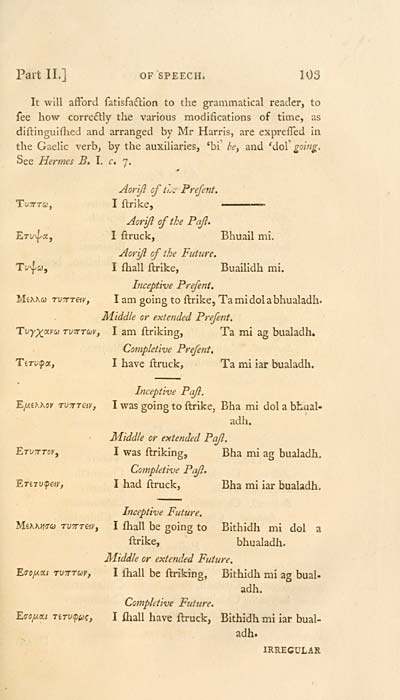Download files
Complete book:
Individual page:
Thumbnail gallery: Grid view | List view

Part II.] OF SPEECH. 103
It will afford fatlsfadllon to the grammatical reader, to
fee how correftly the various modifications of time, as
diftinguiflied and arranged by Mr Harris, are exprefTed in
the Gaelic verb, by the auxiliaries, 'hi' he^ and 'dor going.
See Hermts B, I. c. 7.
Aoriji of tl. Frefent.
TuTTTUy I ftrike, •
Jori/I of the Pafi.
'Lt\j-\(x, I ftruck, Bhuail mi.
Aorift cf the Future.
T-o-\a^ I fliall ftrike, Buallidh mi.
Inceptive Prefent.
ìAiKKa TVTTTeiv, I am going to ftrike, Ta mi del abhualadh.
Middle or extended Prefent.
Tvyx^va tv-tttoiv, I am ftriking, Ta ml ag bualadh.
Completive Prefent,
Teryf a, I have ftruck, Ta mi iar bualadh.
Inceptive Pafi.
Ey.iKKOY rvTTTc-iv, I was going to ftrike, Bha mi dol a bhaal-
adh.
Middle cr extended Pafi.
Etvtttoy, I was ftriking, Bha mi ag bualadh.
Completive Pajl.
Emvtpeiy, I had ftruck, Bha mi iar bualadh.
Inceptive Future.
MiKhma TVTTetYj I fhall be going to Bithidh mi dol a
ftrike, bhualadh.
Middle or extended Future.
Ecroy.xi tvtttuv, I ftiall be ftriking, Bithidh mi ag bual-
adh.
Completive Future.
Eto/xxi TtTV(p(^^, I fliall have ftruck, Bithidh mi iar bual-
adh.
IRREGULAR
It will afford fatlsfadllon to the grammatical reader, to
fee how correftly the various modifications of time, as
diftinguiflied and arranged by Mr Harris, are exprefTed in
the Gaelic verb, by the auxiliaries, 'hi' he^ and 'dor going.
See Hermts B, I. c. 7.
Aoriji of tl. Frefent.
TuTTTUy I ftrike, •
Jori/I of the Pafi.
'Lt\j-\(x, I ftruck, Bhuail mi.
Aorift cf the Future.
T-o-\a^ I fliall ftrike, Buallidh mi.
Inceptive Prefent.
ìAiKKa TVTTTeiv, I am going to ftrike, Ta mi del abhualadh.
Middle or extended Prefent.
Tvyx^va tv-tttoiv, I am ftriking, Ta ml ag bualadh.
Completive Prefent,
Teryf a, I have ftruck, Ta mi iar bualadh.
Inceptive Pafi.
Ey.iKKOY rvTTTc-iv, I was going to ftrike, Bha mi dol a bhaal-
adh.
Middle cr extended Pafi.
Etvtttoy, I was ftriking, Bha mi ag bualadh.
Completive Pajl.
Emvtpeiy, I had ftruck, Bha mi iar bualadh.
Inceptive Future.
MiKhma TVTTetYj I fhall be going to Bithidh mi dol a
ftrike, bhualadh.
Middle or extended Future.
Ecroy.xi tvtttuv, I ftiall be ftriking, Bithidh mi ag bual-
adh.
Completive Future.
Eto/xxi TtTV(p(^^, I fliall have ftruck, Bithidh mi iar bual-
adh.
IRREGULAR
Set display mode to: Large image | Transcription
Images and transcriptions on this page, including medium image downloads, may be used under the Creative Commons Attribution 4.0 International Licence unless otherwise stated. ![]()
| Early Gaelic Book Collections > Blair Collection > Elements of Gaelic grammar > (133) |
|---|
| Permanent URL | https://digital.nls.uk/79041571 |
|---|
| Description | A selection of books from a collection of more than 500 titles, mostly on religious and literary topics. Also includes some material dealing with other Celtic languages and societies. Collection created towards the end of the 19th century by Lady Evelyn Stewart Murray. |
|---|
| Description | Selected items from five 'Special and Named Printed Collections'. Includes books in Gaelic and other Celtic languages, works about the Gaels, their languages, literature, culture and history. |
|---|

